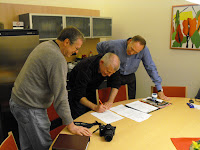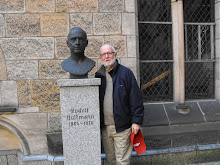

The following is from Bob Edwards' Friday letter to missionaries. I'm using it with permission:
Sunday, March 15 was the last day that I was in Berlin for the Presidents' Meeting. Kelley and Rhonda along with their German friends and colleagues Cymin Samawatie and Ralf Schwarz had planned to have a gathering of un-churched and pre-Christian friends on that night. It was a Jazz Concert held in a back room of an Iranian vegetarian restaurant. Berlin is quickly becoming the fine arts center of Europe. It is also a young city as can be readily seen as you walk the streets day or night. In order to interest these two groups of people the Berlin Team will be using events like this one to bring persons together around the arts in order to introduce them to the Lord.
This particular meeting featured a Christian jazz bass musician from Portland, Oregon, David Friesen (www.davidfriesen.net) who is presently touring Europe. Friesen has been playing with German guitarist, Uwe Kropinski (www.kropinski.com) for many years. The arrangement of this event was that after a short introduction, they played a number together. Cymin then interviewed Uwe. Another number was played and then she interviewed David. The evening ended with a spectacular final number.
The interviews were fascinating. The deeper they got into the conversation, the more I realized that there was something being said here that I wished to note down and consider. Here are a few of the notes that I wrote down
Uwe: "I choose between the passion of the doing of music as opposed to the managing of that music. I cannot manage it or I loose the passion."
Uwe: "During a performance, you must take your eyes off yourself and how you are performing. If you are looking for needs to serve, you forget yourself and immerse yourself in that music."
Friesen: "I compose my music to please myself. If I try to please others, I know I won't get it right. But if I can please myself then I can be satisfied, and usually I then am able to communicate that passion with the audience."
When asked about what happens if during the performance of a jazz piece he has a lapse in concentration. Uwe answered, "It cannot happen. I play in the moment. I can't think about mistakes made in the past, or worry about notes that I must play in the future. But I must be present in the 'now.' What I am doing right now. That is where my concentration must be. Learning to follow where the tune will lead me."
Friesen stated about his music, "Music is made to glorify God. Not to glorify self. Do all you can to glorify God. Walk beside him. Don't walk behind him or try to run out in front of him."
Cymin Samawatie and Ralf Schwarz are working closely with Kelley and Rhonda in the development of Gateway Berlin. Both of them grew up in Church of God congregations in Germany. They are internationally known musicians. If you would like to look at their web page, and perhaps listen to some of their music go to
www.Cyminology.de.
Click on the












